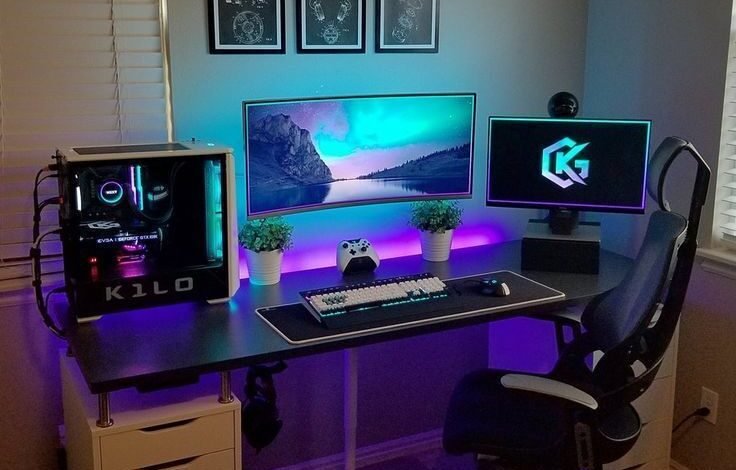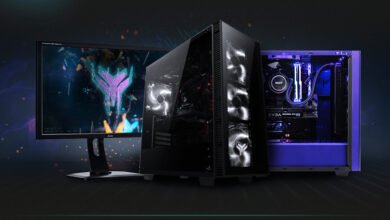PC Gaming Essentials – Your Comprehensive Guide

In the digital realm of gaming, PC Gaming Essentials is established as a resourceful and captivating experience. Descending into PC gaming can be exciting and fantastic, with many hardware organization, software options, and customization possibilities. Whether you’re a knowledgeable gamer or just starting, understanding the essentials is necessary for an advantageous gaming experience.
PC gaming offers a unique combination of workability, performance, and community arrangement. Unlike comfort gaming, which frequently has hardware limitations, PCs allow gamers to customize their setups to suit their desire. The appeal of high frame rates, stunning graphics, and modding capabilities attracts enthusiasts worldwide.
Choosing the Right Hardware
“Choosing the Right Hardware” entails the careful selection of components that form the base of a high-performance gaming PC. It involves making allowance factors such as performance, compatibility, budget, and future upgradeability to create a balanced and efficient system.
Key considerations when choosing hardware include:
Graphics Card (GPU): Selecting a GPU with enough power and VRAM to handle the demands of modern games at want settings and resolutions.
Processor (CPU): Choose a CPU that offers solid single-threaded gaming performance and multitasking capabilities for other tasks.
RAM: Opt for enough RAM to ensure smooth gameplay and multitasking without bottlenecking performance.
Storage: Deciding between SSDs and HDDs based on speed, capacity, and budget considerations.
Other components: Considering factors such as motherboard compatibility, power supply efficiency, and cooling solutions to ensure a well-rounded and reliable gaming setup.
By carefully evaluating these factors, gamers can create a customized hardware configuration that meets their gaming needs and preferences while continuing within budget constraints.

Peripheral Devices
“Peripheral Devices” refer to the external hardware components that accompany the core elements of a gaming setup, enhancing both functionality and user experience in PC gaming essentials. These devices expand beyond the central processing unit and enclose accessories that are directly connected to the user. Among the beginning peripheral devices are the monitor, keyboard, mouse, and headset, each playing a crucial role in creating the gaming environment.
The monitor is the visible entrance into the gaming world, offering different resolutions, refresh evaluations, and panel technologies to serve various preferences and budgets. A high-quality monitor with low response times and adaptive sync technology can significantly enhance involvement and gameplay increased.
Keyboards and mice, often customized for gaming, provide exact control and understanding, which are crucial for aggressive gaming scenarios. Features such as mechanical switches, programmable keys, and customizable RGB lighting better performance and add a customized connection to the gaming setup.
Headsets deliver captivating audio experiences, allowing gamers to pinpoint challenger footsteps and communicate effectively with collaborators. With features like perimeter sound, noise cancellation, and comfortable ergonomic designs, headsets upgrade gaming’s auditory experience, enhancing overall involvement and planned awareness.
In the center, peripheral devices provide the interface between the player and the in-effect world, offering customization options, ergonomic benefits, and sensory enhancements to enrich the gaming experience. Choosing the right peripherals is essential for optimizing comfort, performance, and involvement, ensuring an ideal and enjoyable gaming journey.

Gaming Accessories
“Gaming Accessories” encompasses a diverse range of increased items designed to augment the gaming experience, providing both practical functionality and attractive enhancement to the gaming setup. These accessories go beyond the essential hardware components and peripheral devices and present gamers with additional customization, comfort, and convenience.
Among the raised gaming accessories are gaming chairs, mousepads, and controllers, each designed to improve support, performance, and general enjoyment during gaming sessions.
Gaming chairs are ergonomically designed with support, adjustable, and lean-back capabilities. They ensure proper posture and comfort during extended gaming sessions, provide physical support, and enhance the captivating gaming experience by minimizing fatigue.
Mousepads, often overlooked but essential for purity and control, come in various sizes, materials, and designs. A high-quality mousepad offers smooth and compatible external mouse movement and guarantees correct tracking and responsiveness, especially in fast-paced gaming scenarios.
Controller: For gamers who prefer console-style controls, a compatible controller offers familiarity and versatility across various game genres.
While traditionally associated with console gaming, administrators have become popular accessories for PC gaming. They offer alternative control schemes and enhanced compatibility with specific game genres. From traditional gamepads to specialized controllers customized for particular games, these accessories provide versatility and benefits for gamers who search for different input methods.
Gaming accessories are vital in customizing and optimizing the PC gaming essentials experience. They offer ergonomic benefits, precision control, and captivating enhancements to elevate gameplay. Choosing the right gaming accessories customized to separate preferences and styles can increase support, performance, and enjoyment, enhancing the gaming experience.

Gaming Software
“Gaming Software” refers to the suite of digital programs and platforms that facilitate the gaming experience on a PC. Unlike hardware components, which constitute the physical infrastructure of a gaming setup, gaming software encompasses the digital tools and applications necessary for running and enjoying games.
This category includes various elements, such as operating systems and game launchers, essential for managing and accessing gaming content.
Operating System: The operating system (OS) provides the backbone of a PC, providing the interface and resources necessary for running software, including games. While multiple OS options exist, Windows remains the dominant choice for gaming due to its extensive compatibility with gaming software and drivers.
Game Launchers: Game launchers are digital platforms that provide displays for purchasing, downloading, and managing games. Famous examples include Steam, Origin, and the Epic Games Store; each gives an extensive library of titles, social features, and community functionalities. These platforms also provide features like mechanical updates, cloud saves, and multiplayer matchmaking, streamlining the gaming experience for users.
In summary, gaming software encompasses the digital infrastructure necessary to enter and enjoy PC games. From the operating system that powers the hardware to the game launchers that provide access to a vast array of gaming content, these software elements play a pivotal role in modeling the PC gaming experience and ensuring ideal access to entertainment for gamers worldwide.
Internet Connection
“Internet Connection” mentions the essential link between PC gaming essentials and the online world, qualifying access to multiplayer gaming, content courses, and digital distribution platforms. In PC gaming, a secure and constant internet connection is most important for the most decisive matches and excellent gaming experience, particularly in multiplayer and online gaming.
The standard of an internet connection is measured by factors such as speed, reaction time, and reliability.
Speed: Internet speed, typically measured in information per second (Mbps), decides how quickly data can be conducted between the gaming device and the Internet. Higher speeds facilitate faster downloads, smoother online gameplay, and minimize shield during content flow.
Latency: Latency, or certain, refers to the time data travels between the gaming device and the server. Low latency is crucial for online gaming, as it minimizes slow down between player actions and server reaction, securing a more reactive and captivating gaming experience.
Reliability: A reliable internet connection maintains consonant performance and uptime, minimizing disruptions and dropped connections during gaming sessions. Reliable connections are essential for competitive gaming, where even quick interruptions can affect gameplay and competitiveness.
Gamers can select from various types of internet connections, counting wired (Ethernet) and wireless (Wi-Fi or mobile broadband), each with advantages and control. Wired connections typically offer lower latency and higher security, making them ideal for gaming, while wireless connections provide significant flexibility and benefit, albeit with potential performance trade-offs.
In summary, the internet connection is the safety of online gaming, connecting players to practical worlds, multiplayer matches, and digital communities. By grade speed, latency, and reliability, gamers can ensure a simple and continuous gaming experience and encourage comfort and competitiveness in the ever-expanding landscape of online gaming.

Optimizing Settings
“Optimizing Settings” involves fine-tuning various guidelines within a PC gaming setup to achieve the perfect balance between optical quality and performance. This process entails adjusting graphics settings, determination, and other in-game options to showcase the hardware’s potential while maximizing the gaming experience.
By optimizing settings, gamers can enhance optical fidelity, plainness, and responsiveness, ensuring a captivating and excellent gameplay experience. Key considerations include:
Graphics settings: Adjusting parameters such as appearance quality, anti-aliasing, and shadow detail to achieve the want balance between visual realism and frame rate.
Resolution: Choosing the appropriate display resolution to match the ability of the monitor and graphics card, balancing intensity with performance.
Performance optimization: Modify settings to minimize input lag, pause, and other performance issues, maximizing gameplay increases and responsiveness.
By carefully optimizing settings, gamers can customize their PC gaming essentials experience to action their preferences and hardware capabilities, unlocking the full potential of their gaming rig for a genuinely captivating and enjoyable experience.
Maintaining Your PC
“Maintaining Your PC” involves a series of regular tasks to maintain the gaming hardware and software’s performance, stability, and longevity. This dynamic approach helps prevent hardware failures, software glitches, and performance degradation, ensuring a smooth and reliable gaming experience.
Critical aspects of maintaining a gaming PC include:
Regular cleaning: Remove dust and waste from internal components such as fans, heat descend, and filters to prevent overheating and system slowdowns.
Software updates: Keeping the operating system, operator, and gaming software up to date to patch security vulnerabilities, fix bugs, and optimize performance.
Hardware checks: Monitoring temperatures, voltages, and system health using monitoring tools to recognize and direct potential hardware issues before they escalate.
Backup and data management: Creating regular backups of essential files and data to protect against data loss due to hardware defeat or software double-dealing.
By adopting a proactive approach to PC maintenance, gamers can ensure their systems remain stable, dependable, and well-organized to provide optimal performance for PC gaming essentials and other tasks.

Gaming Communities
Gaming Communities refer to the incredible network of online and offline groups, conferences, and social platforms where gamers collect to connect, share experiences, and engage in discussions related to video games. These communities provide hubs for like-minded individuals to interact, collaborate, and form friendships located on their give-out acceptance of gaming.
Online gaming communities include gatherings, social media groups, and gaming-centric websites where gamers can discuss game strategies and share gameplay highlights and advice from customer experts. These communities often have party-giver events, struggles, and tournaments, encouraging an awareness of togetherness and competition among members.
Offline gaming communities include local gaming clubs, meetups, and conferences where gamers can collect in person to play games, attend workshops, and share in gaming-connected activities. These gatherings provide opportunities for interaction, networking, and establishing continuing connections with fellow gamers.
Overall, gaming communities enrich the gaming experience by providing an encouraging and comprehensive environment for gamers to connect, learn, and grow together.
Conclusion
Embarking on the PC gaming journey requires alert consideration of hardware, software, and community arrangement. By understanding and implementing the essentials outlined in this guide, gamers can create immersive and rewarding gaming experiences customized to their preferences.
FAQs
Do I need a high-end PC to enjoy gaming?
Not necessarily. Many games are optimized to run on a wide range of hardware configurations, allowing players to appreciate gaming on modest setups.
How central is internet speed for online gaming?
A stable internet connection with some reaction time is pivotal for online gaming, exceptionally competitive multiplayer games.
Are gaming chairs worth the investment?
Gaming chairs offer ergonomic support and comfort through extended gaming sessions, making them a worthwhile investment for experts.
Can I upgrade my gaming PC over time?
Yes, PC gaming setups are highly customizable and upgradeable, incrementally allowing gamers to improve performance as needed.








